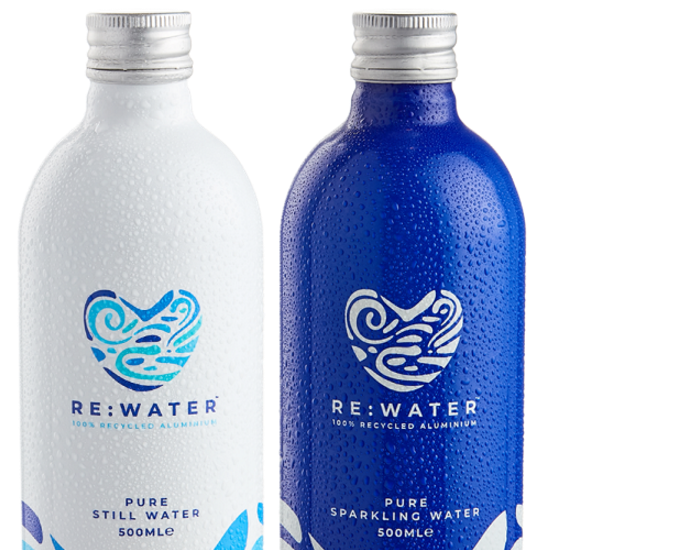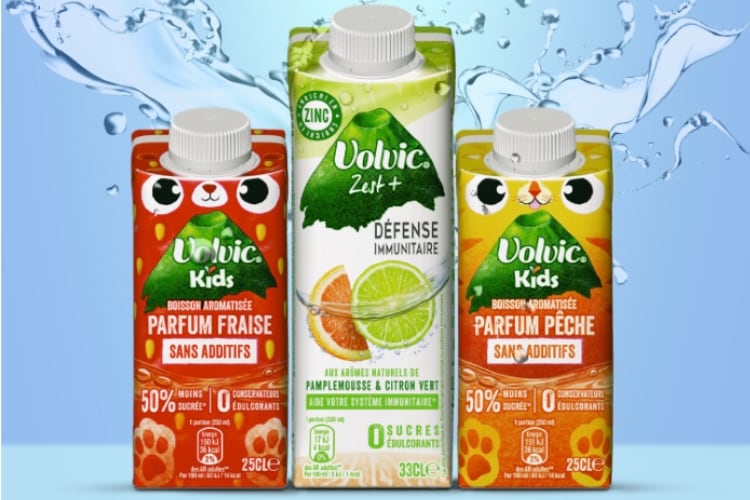Re:Water, a British spring water brand that comes in 100% recycled aluminium bottles, is being served to global leaders today (11 June) at the G7 Summit. As the gathering focuses on the need to ‘build back better’ post COVID to ‘create a greener, more prosperous future’, the decision to ditch single-use plastics at the event is a reflection of both political ambition and public sentiment.
Matt Crocker, Re:Water co-founder, believes the group’s partnership with the UK Foreign Office is a good example of the government putting its money where its mouth is. “We are really proud to supply the G7. The government often talks about targets – reducing carbon emissions, moving to net zero, reducing single-use plastics. Re:Water does all that. It’s cutting single-use packaging, plastics and carbon emissions.”
Berrington is a water supplier that has ‘been around for decades’. The Herefordshire spring water company ‘traditionally’ bottles its water in plastic and glass. Hospitality customers include the likes of Itsu, Leon and The Four Seasons.
UK consumers have soured towards single use plastics. According to Kantar data, bottled water sales dropped by 6.3% in the year to November 2019. As the mood changed towards plastics, Berrington began to cast around for sustainable packaging alternatives.
Three principles informed this work, Crocker revealed. “Firstly, we wanted something genuinely green. There are quite a few options that, when you scratch the surface, aren’t actually any better. Secondly, consumers need to like it… And finally it has to be commercially viable.”
The solution: The ‘word’s first’ 100% recycled aluminium bottle.
“What we came up with sounds extremely simple, but it actually took three years to get to market,” Crocker reflected.
Recycled and recyclable for a circular solution
The lightweight aluminium bottle and aluminium cap is itself 100% recyclable and – importantly for Crocker – widely recycled. “When it comes to recycling there are lots of misunderstandings. It is a complicated issue,” he told us.
Crocker pointed to the fact that while drinks cartons can be made of recyclable material, many councils don’t actually recycle them because they have to separate the different layers that the packaging is made from. On average, he explained, ‘only 24%’ of a drinks carton is recycled... ‘If you can find a recycling depot that will take it’.
In contrast, aluminium is widely recycled. Indeed, it is one of the most recycled materials in the country with a recycling rate of more than 75% versus 58% for PET. Significantly, ‘metals recycle forever’.
Counting the carbon cost
Developing Re:Water’s distinctive aluminium bottles, Berrington also undertook carbon foot printing work. Because it uses recycled aluminium, the bottle creates 95% less CO2 emissions than standard aluminium.
The production of each bottle generates 432g of CO2. This compares to between 70-200g for a plastic alternative. But, Crocker stressed, Re:Water’s bottles are made to be re-used, bringing down the comparative total each time a refill takes place. “You only have to use it 2.5 times to match plastic,” he told us.
Re:Water’s approach has another advantage. If consumers recycle the bottle, it actually becomes carbon negative because it can be offset against the production of new aluminium. “If someone buys, re-uses and recycles Re:Water it is carbon negative. The hope is people will use it as a refillable container.”
Is this a strange hope for a company that wants to get repeat purchase for its spring water? “It is a question we get asked a lot,” Crocker told us. “It’s a bit like a bag for life. People will go into a food-on-the-move location and purchase it. Then they might use it in the office during the day and recycle it when they get home. But when they come back to that food outlet, they will buy it again,” he predicted.
Premium pricing: Aluminium will 'never beat plastic on margin'
The re-usable nature of the bottle also unlocks a premium price positioning for Re:Water, where people are willing to pay a bit more for a product that they view as delivering greater value.
The company recently completed a test with a service station company that placed Re:Water (£2.50), alongside cans (£1.50) and cartons (£1.80). “We outsold both cans and cartons,” Crocker revealed. “Because it is refillable it gives premium price acceptance.”
That said, the drinks executive conceded that an aluminium bottle will ‘never beat plastic on margin’. Nevertheless, he argues, because the solution is addressing a declining market it can deliver incremental growth and a higher contribution to businesses.
Indeed, in an exclusive launch with Itsu, the refillable water brand tripled sales projections and now accounts for 20% of the restaurant’s total water sales. The higher price point delivers 17% incremental revenue.
Given these positive early signs, Crocker is bullish on the group’s ability to scale its plastic-free solution. “We have huge growth plans.”



